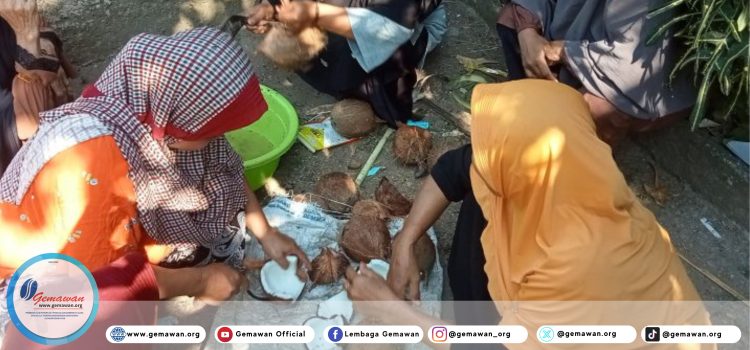
“From this coconut oil, we see the hope of creating home-based enterprises rooted in local resources — a tangible movement toward food and energy self-sufficiency at the household level.”
— Welli Arma
In Pulau Maya Subdistrict, Kayong Utara Regency, the Gemawan Association held an energetic and inspiring training session for women farmers. Over two days in July 2025, the village of Dusun Besar witnessed the skilled hands of women learning how to transform mature coconuts into pure coconut oil.
This initiative was a direct follow-up to local women farmers’ plans to increase the market value of agricultural products and foster grassroots economic independence.
According to the Gemawan Kayong Utara Coordinator, the training was specially designed to empower women.
“Our coastal areas are rich in coconut resources, and women play a crucial role in managing them,” he explained.
The goal, he emphasized, was twofold: to provide women with technical skills in coconut oil processing and to strengthen household economies while reducing dependence on palm oil consumption.
“From this coconut oil, we see the hope of creating local, home-based enterprises — a real step toward family-level food and energy sovereignty,” he added, highlighting the philosophy behind the initiative.
Women Empowering Women
Among the participants was Mahera, a member of the Kayong Utara Women’s Union (SETARA) and a resident of Pulau Maya. With deep knowledge and enthusiasm, she explained the remarkable benefits of traditionally processed coconut oil.
“This oil contains lauric acid, which acts as a natural antioxidant and antibacterial agent,” Mahera explained.
The benefits, she noted, are extensive — from balancing cholesterol levels, supporting heart health, and aiding digestion, to nourishing the skin and hair naturally.
She then guided participants through the traditional process of making coconut oil — a practice rich in local wisdom and patience.
The Traditional Process: From Coconut to Golden Oil
Everything begins with the selection of high-quality mature coconuts — those with thick, oil-rich flesh that can be stored longer. The selected coconuts are grated finely using traditional tools, then pressed firmly to extract thick, pure coconut milk.
The milk is then filtered through a clean cloth, separating coarse residue from the rich white liquid ready for processing.
“To enhance the aroma, you can add pandan leaves while cooking,” Mahera suggested with a smile.
The coconut milk is poured into a large wok and cooked slowly over a wood-fired stove — a process that takes four to five hours of patience and attention. The fire must be kept steady, and the changes in color and texture become the key indicators.
“Be mindful when the oil turns clear and the residue at the bottom becomes golden brown — that’s the sign it’s perfectly done,” she explained.
Once cooked, the oil is left to cool naturally before being filtered once more through fine bamboo or metal sieves to ensure its purity before being stored in clean glass bottles.
“Yes, it seems long and complicated at first,” Mahera admitted, “but with precision and consistency, it becomes simple over time. And the potential as a home-based business is tremendous.”
Empowerment Through Local Resources
By the end of the training, hope began to take root. The abundant coconut resources of Pulau Maya’s coastal communities serve as a powerful foundation. This training is expected to spark greater community initiative — especially among women — to maximize the use of local raw materials readily available in their surroundings.
The coconut oil produced by their own hands is not only a healthier option for daily consumption, but also holds strong economic potential as a marketable product.
Through this process, women are emerging as key pillars of local economic development, proving that empowerment begins with the courage to create, to learn, and to transform everyday resources into pathways of independence and resilience.
Author: Welli Arma, Gemawan
Source: Kalbar Today
